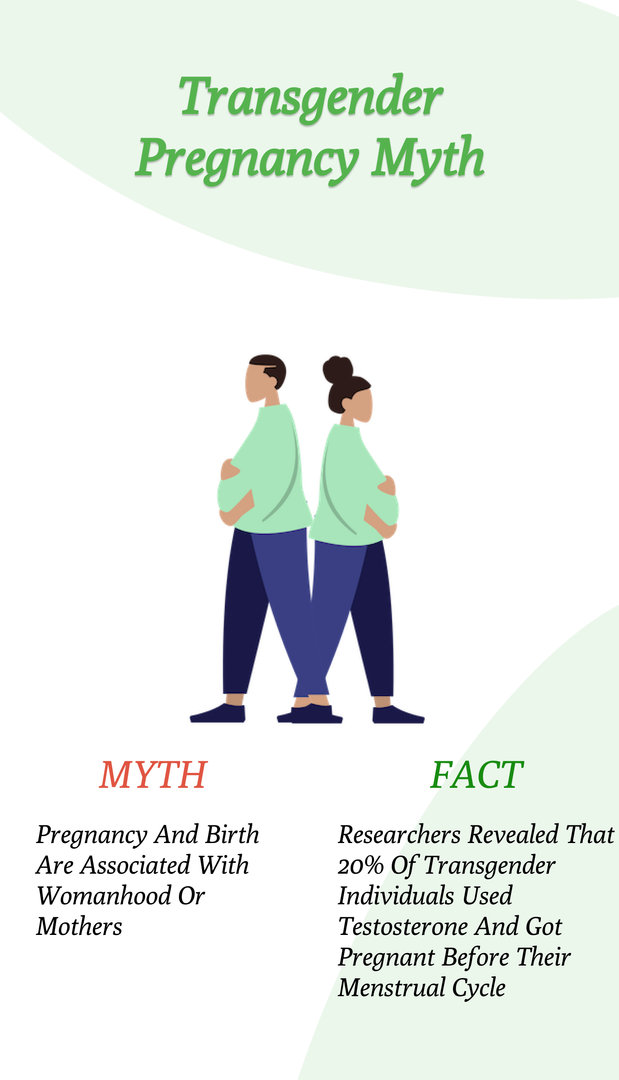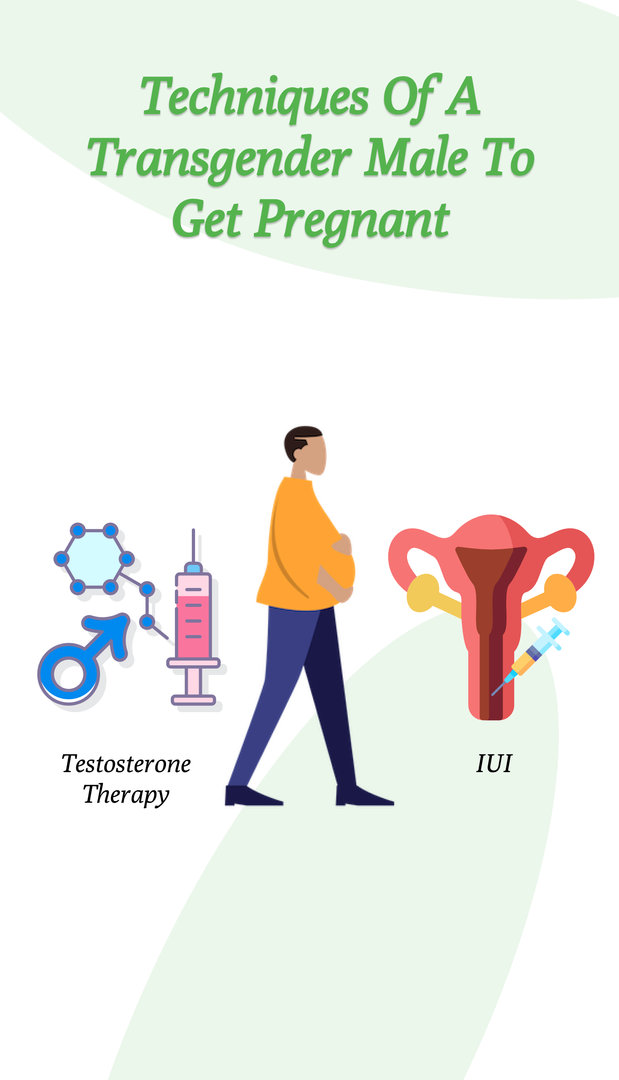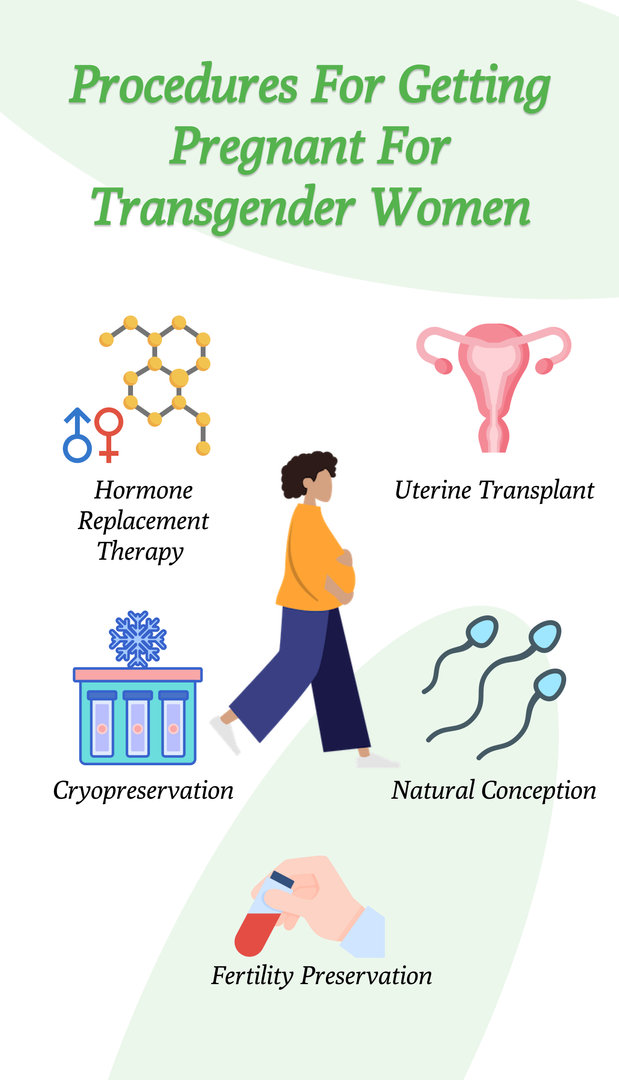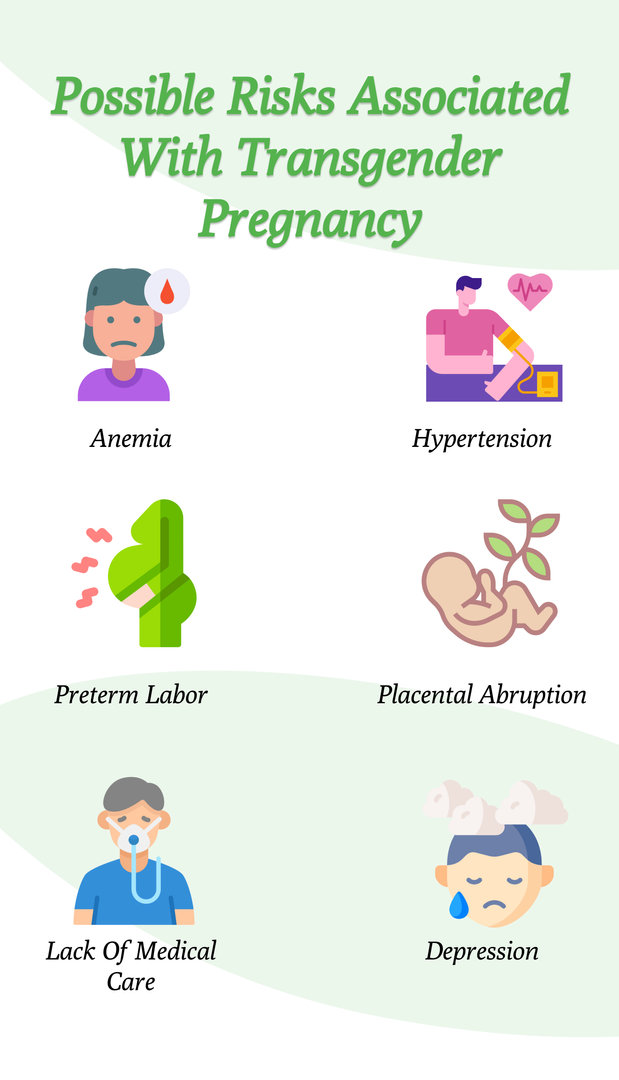Can A Transgender Get Pregnant?
Yes, transgender individuals can get pregnant, but it depends on their anatomy and the treatments they have undergone.
Transgender men (assigned female at birth but identified as male) can become pregnant if they retain their uterus and ovaries. Those on testosterone therapy can often regain fertility by stopping the hormone treatment. Approximately 20% of transgender men keep their reproductive organs after transitioning, and many have successfully carried pregnancies.
In 2019, about 1,000 transgender men in the U.S. were pregnant or had recently given birth.
Transgender women (assigned male at birth but identified as female) cannot conceive naturally because they lack a uterus and ovaries. However, they have other options like adoption, surrogacy, or using preserved sperm for procedures such as in vitro fertilization (IVF). Sperm preservation before undergoing gender-affirming surgery provides future possibilities for biological parenthood.
If you’re considering pregnancy or exploring parenthood as a transgender individual, consulting with a plastic surgeon is crucial.

We will discuss all transgender pregnancy in detail, but let's start first start with
Can A Trans Man Get Pregnant?
Yes, a trans man can get pregnant, depending on several factors:
- Reproductive Organs: If a trans man retains his uterus and ovaries without undergoing surgical removal, he can potentially conceive. Testosterone therapy can reduce ovulation and menstrual cycles, but it doesn't eliminate the possibility of pregnancy.
- Hormone Therapy: While testosterone lowers fertility by suppressing ovulation, it is not a reliable method of birth control. Even if menstruation stops, pregnancy can still occur if the reproductive organs are intact.
- Assisted Reproductive Technologies: Some trans men may choose assisted reproductive methods like sperm donation or in vitro fertilization (IVF), with or without a surrogate, to achieve pregnancy.
An example of a transgender man who got pregnant through artificial insemination is Thomas Beatie. He was assigned as female at birth but in early 1997, he came out as a transman. He decided to get pregnant because his wife was infertile.
That's not it!
On 3rd February, 2023, NDTV, one of the most trusted media outlet published an article stating that a transman in Kerala,India named Zahad is pregnant and is expecting a baby in March'23! The trans couple Zahad and Ziya both are delighted about the pregnancy and have shared the news on their social media handle too.
"Time has brought us together. It has been three years. Like my dream of mother, his dream of father and a desire of our own brought us to one thought. Today 8 months old Jeevan is moving in his belly with full consent......supporting the decisions we made to make our wishes come true," Ziya wrote in the caption, adding, "As far as we know India's first TRAN'S MAN PREGNANCY".
Transgender men can conceive if they retain functioning ovaries and uterus. On the other hand, hormone replacement therapy treatments also increase the chances of pregnancy progress and birthing methods. Mostly, it is the same as for cisgender women.
Now you must be thinking, how is that even possible? Well, if you'd like to know more about it, please read ahead the procedure.
How Can A Trans Man Get Pregnant?
Now, the question is, how is a transgender man able to become pregnant? In this section, we have discussed different ways that make a trans man pregnancy possible.
Prevalence of Trans Man Pregnancy
Whether a trans man can get pregnant depends on several factors, and the specific methods or options differ based on individual circumstances and desired outcomes.
Naturally:
If a trans man still has a functioning uterus and ovaries, and is ovulating:
- He can potentially become pregnant through intercourse with a sperm donor or partner.
- Conception may be more likely if he temporarily stops taking testosterone therapy, allowing ovulation to resume.
Even if periods have stopped due to testosterone, ovulation may still occur in some cases.
Assisted Reproductive Technologies (ART):
Intrauterine insemination (IUI): Sperm can be directly placed in the uterus using a catheter, often with fertility medications to stimulate ovulation.
In vitro fertilization (IVF): Eggs are taken, fertilized in a lab, and the embryos are placed in the uterus. This method allows for donor sperm or eggs, giving options if the trans man lacks sperm production or functional ovaries.
Surrogacy: A carrier carries and delivers the pregnancy for the intended parents. This is an option if the trans man can't carry a pregnancy due to missing or non-functional reproductive organs.
Testosterone Therapy: Despite common belief, trans men can conceive after stopping testosterone. Consult a fertility specialist to understand how hormone therapy may affect individual fertility.
Pregnancy: The procedures for pregnancy and childbirth are similar for cisgender and transgender males with functional ovaries and a uterus.
However, in transgender male pregnancy, testosterone plays quite a big role. It is essential to understand that male transgenders can easily conceive when their use of testosterone is stopped. For the process, some of them even wait for years or months.

Postpartum Considerations
In postpartum considerations, most professionals recommend male transgender people not to undergo testosterone therapy because it influences breastfeeding negatively.
However, no recent research indicates that testosterone entering breast milk can cause significant changes. But still, the level of testosterone does affect lactation. On the other hand, transgender men have more ability to chest feed through undergoing chest reconstruction surgery.
Want to inquire about personalized treatment expenses? Don't hesitate. Talk to us today.
Can A Trans Woman Get Pregnant?
Yes, it is one of the interesting parts that transwomen can also get pregnant. Different methods are helpful for them, but research suggests that it is more convenient for them to store genetic material.
History reveals an example of the first transgender woman, Christine Jorgensen (1926-1989), in the United States. She was the first transgender because of sex reassignment surgery. She was the one who made it possible and set an example for thousands of female transgenders that they could give life to a child.

Discovering the possibilities for a trans woman to conceive is a journey filled with unique considerations. Let's delve into the methods and insights that illuminate the path to pregnancy for transgender women.
How Can A Trans Woman Get Pregnant?
It is observed that transgender women need to have awareness and complete knowledge about fertility. The prevalence states that only 3% of transgender people preserve fertility. We all know that pregnancy is not permanent, but holding the baby in our arms is a completely different feeling.
Below are some techniques by which transgender women can get pregnant.
Transgender women who are interested in having biological children have several options to consider, each with its own set of challenges and considerations. Here’s a detailed look at the most relevant and feasible methods:
1. Hormone Replacement Therapy (HRT) and Fertility
Hormone replacement therapy, commonly used by transgender women to develop feminine characteristics, can significantly impact fertility.
- Impact on Sperm Quality: HRT often leads to reduced sperm production and quality. Before starting HRT, many transgender women opt to preserve their fertility due to these changes.
- Hormone Testing: Doctors will often conduct hormonal tests to evaluate the impact of HRT on sperm production. Common medications like leuprolide acetate, estradiol, and spironolactone can affect hormone levels and sperm health. The tests help in determining the duration and effects of hormone therapy on fertility.
Factors influencing the impact of HRT on fertility include:
- Ethnicity
- Weight
- Age
- Chronic health conditions
- Demographic characteristics
2. Cryopreservation (Sperm Freezing)
Cryopreservation, or sperm freezing, is a practical solution for transgender women who wish to have children in the future.
- Process: Sperm is collected and frozen before the start of HRT. This preserved genetic material can be used later for assisted reproductive technologies.
- Cost and Accessibility: This process is relatively affordable, typically ranging from $500 to $1,000, depending on the clinic and location.
3. Fertility Preservation
Before starting hormone therapy, transgender women should consider fertility preservation.
- Importance of Timing: Collecting sperm samples before HRT is crucial as it provides a higher chance of retaining viable sperm.
- Assessment of Sperm Health: Professionals will evaluate sperm for concentration (sufficient quantity), morphology (healthy shape), and motility (adequate movement), ensuring good quality for future use.
4. Natural Conception
Although rare, natural conception can be an option if transgender women have a partner with a uterus.
- Pre-Conception Health Checks: Both partners need to undergo fertility evaluations to rule out conditions that could affect conception, such as blocked tubes or fibroids.
- Restoring Fertility Post-HRT: Discontinuing HRT can sometimes restore sperm production, but this process can take several months and may not guarantee fertility.
5. Uterine Transplant
Uterine transplants are an emerging area of medical research that could provide future options for transgender women.
- Current Use: Primarily performed on cisgender women with uterine infertility, this complex procedure involves surgically implanting a healthy uterus into an individual who does not have one.
- Potential for Transgender Women: While promising, the procedure is still experimental for transgender women, who face additional challenges such as chronic issues or cancer risks in the transplanted uterus.
Take charge of your health and your life. Contact us today!
What Are The Risks Involved In Trans Pregnancy?
Some risk factors are involved in trans pregnancy but can be overcome with proper care and desired treatment. The risk factors are possible because of a lack of knowledge, proper care, and awareness of trans pregnancies in the healthcare setup.

The risks involved in trans pregnancy can be divided into several categories, including:
Physical risks:
- Reproductive health complications: This includes potential issues with ovulation, menstrual irregularities, hormonal imbalances, and increased risk of certain pregnancy complications like gestational diabetes or preeclampsia. These may be higher due to prior hormone therapy or existing medical conditions.
- Surgical complications: If the trans man has undergone or plans to undergo gender-affirming surgeries, these can affect pregnancy-related factors like carrying a fetus or delivering a child. Consultation with a specialized healthcare team is crucial to assess potential risks and ensure optimal care.
- Mental health challenges: Some trans men who become pregnant may experience heightened anxiety, depression, or gender dysphoria during this time. Additionally, societal stigma and discrimination can exacerbate these challenges. Access to mental health support tailored to the needs of trans individuals is vital throughout the process.
Social and legal risks:
- Discrimination and stigma: Unfortunately, societal prejudice against transgender individuals can extend to trans men who choose to become pregnant. This can lead to negative attitudes, microaggressions, and difficulties accessing adequate healthcare and support. Navigating legal frameworks surrounding parental rights and birth certificates can also be complex for trans families.
- Healthcare Struggles: Finding understanding healthcare providers for pregnant trans men can be tough, leading to a lack of support and potential discrimination.
- Family Dynamics: Some may struggle to accept a trans man's choice to become pregnant, affecting relationships within the family. This can lead to conflict, stress, and isolation during a time when support is crucial. Open communication and seeking supportive communities can be helpful in navigating these dynamics.
Risks linked to specific methods:
- Stopping Hormone Therapy: If you pause testosterone for pregnancy, expect temporary changes like weight gain and mood shifts. Regular monitoring and gradual adjustments with medical supervision are important.
- Assisted Reproductive Technologies (ART): Procedures like IVF or surrogacy have risks, including multiple pregnancies and complications. Both biological and gestational parents need careful consideration and monitoring.
What is The Success Rate For Trans-Gender Pregnancy?
Various studies showed different success rates of transgender pregnancies.
- A study revealed 5% to 7% pregnancy success rates in transgender adolescents and adults.
- Another research by Light et al. showed pregnancy rates of 60% after using contraception.
- Moreover, unplanned pregnancy rates in transgender TGNC youth were seen at 26%, and another study reported the rate to be 40%.
Anyone whose gender differs from what was presumptively supposed at birth is considered transgender. It is essential to understand that transgender, whether male or female, can give birth to a child.
Thomas Beatie sets an example of a transgender male becoming pregnant and proves to other transgenders that miracles can happen too. The pregnancy rate among adult transgenders is increasing and professionals are also exploring various methods and strategies to be more progressive. The methods of pregnancy for cisgender and male transgenders are almost the same.
Among female transgender, Christine Jorgensen sets an example in the United States. The methods of conception and conceiving are different for both. But, mostly for MtF, freezing, and storing genetic material, a uterine implant is required.
Your well-being is our priority - call us to book your appointment today
References:







